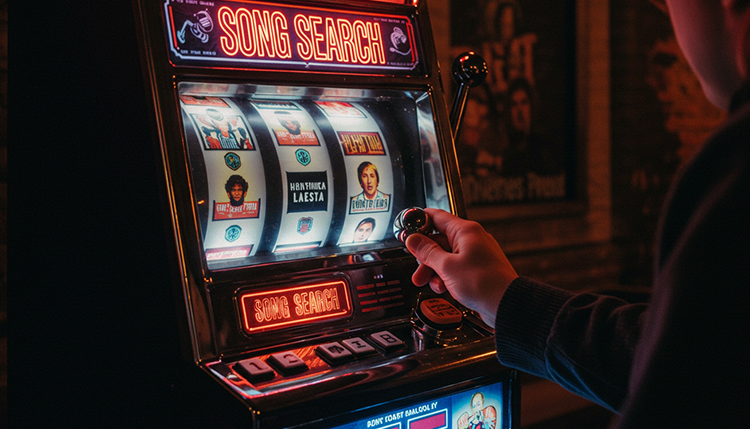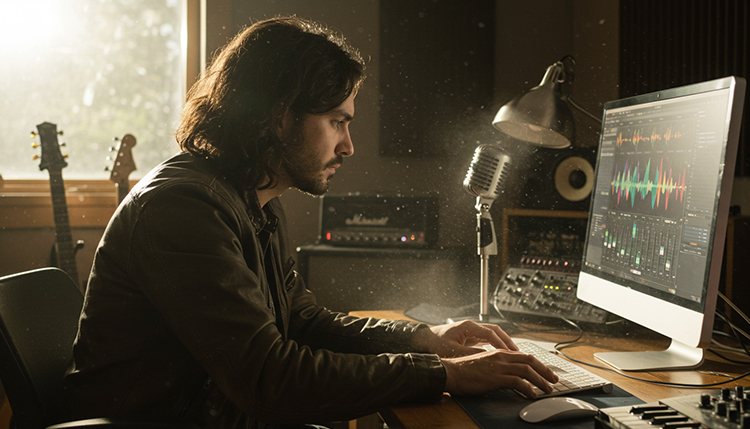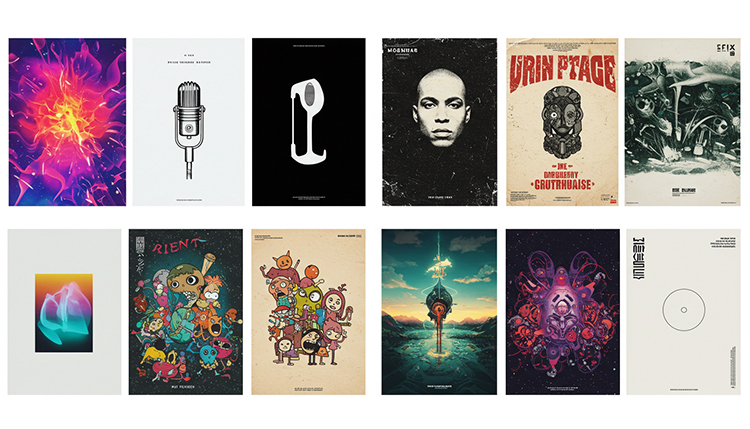Find Any Song by Lyrics using Song Lyrics Search Tools
Table of Contents
I had this song stuck in my head once but couldn’t think what it was called!
You probably know this feeling too.
Music people like me and you gets this thing where a song plays in our brain but we can’t remember it’s name. It’s really hard when this happens and makes me feel frustrated.
Now we got these song finder by lyrics tools that are super good at finding songs when you only remember some words from them.
These song finder things changed how I find music that I heard before but forgot the name of. No more trying to hum songs to my friends or telling them about music videos and hoping they know what song I mean.
Technology helps us now, and this guide shows you the best ways to find songs you can’t remember.
If you just listen to music sometimes and want to find a song from a commercial, or if you love music a lot and want to make the perfect playlist, these tools will help you never lose a song again. Let me show you how to search for lyrics and find songs using the words you remember!
How Song Finder By Lyrics and Search Tools Work
Song finder tools use really smart computer stuff that has big databases with millions of song words in them.
These tools keep huge collections of lyrics – I mean like millions and millions of songs from lots of years and different music types.
When you type some words you remember, the computer tries to match them with songs it knows about. It’s like having someone who knows every word from every song ever made!
The cool part happen when these tools work with information that isn’t perfect.
Most smart lyric search things use special matching that can find songs even when you spell words wrong or get them in the wrong order.
This is really important because most people don’t remember song words exactly right, according to research on mishearing lyrics.
Behind the scenes, these tools give scores to songs based on how well they match what you searched for. Songs with higher scores show up first in your results.
Many new lyric finders also look at which words often go together in songs to make better matches.
Like if someone searches “highway to” the system might show “Highway to Hell” first because those words go together a lot in popular music.
The big collections of lyrics come from different places:
- Real lyrics from music companies and record labels
- Lyrics that users added to community websites
- Lyrics taken from digital music services
- Words written down from music videos and live shows
How good these databases are makes a big difference in how well the search works.
Some song finder tools spent lots of money building huge, checked lyric collections that power their own sites and also give data to other services through partnerships.
These tools do have some limits though. Unknown indie songs, brand new releases, and songs in languages that aren’t used much online often don’t work as well.
Local music scenes might not be included as much as mainstream Western pop and rock. How well it works also depends on how unique the lyrics you search for are.
Something special like “Scaramouche, will you do the Fandango” will give better results than something common like “I love you baby.”
The technology keeps getting better fast. Newer systems use machine learning to get better over time based on how people use them, as explained by experts in music technology.
Some really advanced platforms can even find songs from badly wrong or misheard lyrics by looking at how words sound instead of exact word matches.
This tech foundation explains why today’s song finder tools seem almost magic in finding tracks from tiny lyric pieces – they use smart algorithms with huge data collections to connect listeners with songs stuck in their heads.
Best Song Lyrics Search and Finder Apps and Websites
There’s lots of song lyric search tools online made just for finding songs from word pieces or getting full lyrics for songs you already know.
Each one does something different and works better for different things.
Google is still the easiest place to start when I want to find songs by lyrics. Just typing some words I remember usually gives good results, especially for popular songs.
Google uses its huge search power to look at lyrics on tons of websites, which makes it really good for mainstream music.
For searching lyrics more seriously, Genius used to be called Rap Genius and is one of the best platforms you can use.
What started as a hip-hop lyrics site grew into a big music encyclopedia with a huge database covering almost all music types. Their community system gives not just lyrics but also explanations of references and cultural stuff – super helpful for understanding what you’re actually singing!
Musixmatch says it has the world’s biggest lyrics catalog with over 8 million licensed tracks. It powers lyric displays for big services like Spotify.
Their app has a powerful search function made just for finding songs by partial lyrics. The platform works with music streaming services so identified songs can be added to playlists right away.
For when you can hear the song playing but don’t know what it is, Shazam is still the best at audio recognition.
While it’s not really a lyrics tool, its new updates include lyric search that works with its famous “listen and identify” feature. This double approach makes it really versatile for song identification in different situations.
Apple Music and Spotify both have lyric search built right into their platforms. This lets subscribers find and play identified tracks without switching between different apps.
The convenience here is huge for people who use these streaming services regularly.
For harder searches with unknown tracks or misheard lyrics, special forums like WatZatSong and r/NameThatSong on Reddit use human intelligence instead of algorithms.
These communities let users describe songs, post audio clips, or share wrong lyrics for others to help identify – sometimes working when automated tools don’t.
Here’s how these platforms compare:
- Database Size: Musixmatch and Genius lead with millions of songs, while community platforms have potentially unlimited reach through human knowledge
- Search Accuracy: Google excels with popular music, while specialized tools like Genius offer better results for obscure tracks
- Additional Features: Shazam provides audio recognition, Genius offers annotations, and streaming services provide immediate playback
- Mobile Experience: Shazam and Musixmatch offer superior mobile interfaces optimized for on-the-go searches
- Language Support: Google handles multiple languages best, while specialized platforms vary in international coverage
Choosing between mobile apps and desktop websites depends mostly on when and where song identification usually happens.
Mobile apps work great for those “what’s that song playing right now” moments in cafes, stores, or cars. Desktop interfaces often give more search options and detailed information for planned searching sessions.
Many people use a combination of these tools depending on the specific situation – maybe starting with Google for a quick search, moving to Genius for deeper investigation, and keeping Shazam ready for identifying songs playing in public spaces.
The best approach often means trying multiple platforms when first searches don’t give results, as each service has different strengths and database coverage.
With this collection of tools available, that mysterious song with the half-remembered chorus won’t stay unidentified for long!
Step-by-Step Guide: How to Use Lyrics Search to Find a Song
Finding a song when all you got is a piece of lyrics doesn’t have to make you frustrated.
With the right way, you can find that hard-to-find tune in minutes or even seconds!
The process starts with getting whatever lyric pieces you can remember, no matter how small or maybe wrong they are. Even one special phrase can be enough to find many songs.
Don’t worry about getting everything perfect – modern search tools are made to handle information that isn’t perfect.
For the most easy lyrics search way, go to Google and type your remembered lyrics inside quotation marks.
The quotation marks tell the search engine to look for that exact phrase, which makes way less potential matches. Adding the word “lyrics” after your quoted phrase makes results even more focused on song-related content.
If Google doesn’t give useful results right away, special lyric search engines like Genius or Musixmatch often give more accurate matches for music-specific searches.
These platforms focus only on song lyrics, getting rid of the noise from general web content that might have similar phrases.
When dealing with possibly misheard lyrics (we’ve all been there with those wrong words), try spelling variations of what you think you heard.
Sometimes what sounds like “hold me closer, Tony Danza” is actually “hold me closer, tiny dancer,” and search engines might need help making that connection!
For really challenging searches, try these advanced ways:
- Include possible genre information if known (“rock lyrics” or “rap lyrics”)
- Add approximate time period if you can narrow it down (“90s lyrics” or “2010s lyrics”)
- Try searching for multiple separate lyric fragments if you remember different parts of the song
- Use wildcard searches with asterisks to fill in blanks (e.g., “walking on * sunshine”)
- Search for distinctive words rather than common phrases (unique terms yield better results)
Voice assistants offer another convenient way to identify songs.
Simply ask Siri, Google Assistant, or Alexa “what’s the song that goes [insert lyrics here]” and these AI helpers will often identify the track immediately.
This hands-free approach is really useful when you’re driving or otherwise busy. The voice recognition technology in these assistants has become really good at understanding natural language questions about music.
If traditional search methods aren’t working, think about whether you might be remembering a cover version instead of the original recording.
Many songs have been performed by multiple artists with slightly different lyrics, which can make identification harder. In these cases, adding potential artist names to your search might help narrow things down.
For those really stubborn cases where automated tools fail, human communities can come to the rescue.
Platforms like Reddit’s r/NameThatSong, WatZatSong, or even music-focused Discord servers connect you with fellow music enthusiasts who enjoy the challenge of identifying obscure tracks.
When posting to these communities, give as much context as possible – not just lyrics, but also when/where you heard it, possible genre, gender of vocalist, memorable instruments, or any other distinguishing features.
The more information you provide, the better your chances of someone recognizing your mystery song, according to research on collective intelligence in music identification.
If all else fails and you heard the song recently on radio or in a commercial, try contacting the station or brand directly.
Many radio stations maintain playlists of recently aired tracks, and commercial music is typically licensed through services that can identify what was used in specific advertisements.
With persistence and these varied approaches, even the most elusive earworm can usually be identified and added to your music library. The satisfaction of finally putting a name to that melody that’s been haunting you makes the detective work worthwhile!
Advanced Tips for Accurate Song Lyrics Search and Identification
For those really challenging song lyric searches, stepping up your search game with advanced techniques can make all the difference.
Search operators represent one of the most powerful tools in your lyric-hunting arsenal. Beyond basic quotation marks, Google and other search engines support lots of special commands that can dramatically improve results.
The minus sign (-) helps exclude irrelevant results – for instance, searching “remember lyrics -Eminem” would find songs containing “remember” but filter out Eminem’s tracks if you know that’s not what you’re looking for.
Combining operators creates even more powerful searches. Like “intitle:lyrics intext:’your remembered phrase'” which specifically targets lyric websites containing your exact phrase.
These search ninja moves can unearth songs that remain hidden in basic searches!
Social media platforms have evolved into surprisingly effective song identification resources. Twitter’s search function can be particularly useful for finding recent or trending songs when you search your lyric fragment along with words like “song” or “lyrics.
Music-focused hashtags like #WhatSongIsThis or #NameThatTune connect you with communities actively helping identify tracks.
TikTok has become an unexpected powerhouse for song identification. Its search function is highly optimized for finding clips featuring specific sounds or lyrics.
The platform’s focus on music-backed short videos makes it a goldmine for identifying trending songs or viral clips.
Foreign language lyrics present unique challenges that require specialized approaches.
If you suspect your mystery song is in another language, try using Google Translate to convert your phonetic approximation into potential matching languages. Specialized databases like Lyricstranslate.com maintain multilingual collections that can help identify non-English tracks.
For Asian language songs particularly, platforms like QQ Music (Chinese) or Utanet (Japanese) offer extensive regional databases that mainstream Western services might miss. The language barrier doesn’t have to be a dead end with these targeted resources.
Consider these additional advanced strategies for tough cases:
- Use temporal context clues (when you first heard it) to narrow search to specific release periods
- Search for distinctive instrumental elements alongside lyrics (“saxophone solo lyrics”)
- Try reverse approaches by searching for artists who commonly use specific words or themes
- Explore genre-specific lyric databases for niche music styles
- Check soundtrack listings if you heard the song in a film, TV show, or video game
Sometimes audio recognition proves more effective than lyric searching, especially when you can recall the melody better than the words.
Beyond Shazam, tools like SoundHound excel at identifying songs from hummed or whistled melodies – perfect for when the tune is clear in your mind but the lyrics remain fuzzy. The Midomi feature (now part of SoundHound) lets you sing or hum into your device to find matching songs based on melodic patterns rather than words.
This approach can be surprisingly accurate even with imperfect renditions.
For particularly obscure tracks, music production databases like WhoSampled can help identify songs through their relationship to other music. If you know your mystery track samples or reminds you of another song, these connections can provide alternative identification pathways.
The site’s extensive documentation of musical relationships has helped solve many challenging identification puzzles.
Don’t underestimate the power of music recognition features built into everyday devices and services. Many smart TVs now display song information during commercials or shows.
Streaming services like YouTube often identify songs used in videos through their Content ID system, displaying track information in video descriptions. Even car entertainment systems increasingly incorporate song identification features.
These passive identification systems might catch your mystery song when you least expect it.
The combination of these advanced techniques creates a comprehensive approach to song lyric search and identification that can crack even the most challenging cases.
With persistence and the right tools, that nagging unknown track will eventually reveal its identity. This allows you to finally add it to your playlist and end the musical mystery once and for all!
Mastering Song Lyrics Search
Never let a song slip through your fingers again!
The days of being haunted by half-remembered melodies and mysterious lyrics are firmly behind us now.
With the collection of song finder by lyrics search tools and techniques covered in this guide, virtually any track can be identified with just a few words or notes. You can easily find complete song lyrics for any music you enjoy.
From powerful dedicated apps to clever search strategies, the options available today make music identification more accessible than ever before!
The technology continues evolving at a remarkable pace. Artificial intelligence and machine learning are making these tools increasingly accurate even with minimal information.
What might have been an impossible task just a decade ago – finding a song from a single misremembered line – is now often resolved in seconds.
This evolution represents more than just technological convenience. It reflects our deep human connection to music and the importance we place on identifying and preserving the songs that move us.
As you apply these song identification methods to your own musical mysteries, remember that different approaches work better for different scenarios. Don’t hesitate to try multiple tools when your first attempt doesn’t yield results.
The perfect solution might be a specialized database, a community forum, or simply a more refined search query.
Customize your approach based on what you know about the song – its genre, era, language, or where you heard it can all provide valuable context for more effective searching.
Beyond just finding songs, these tools open doors to discovering new music through related artists, recommendations, and the joy of falling down musical rabbit holes. Each identified track can become a gateway to expanding your musical horizons and connecting with artists you might never have encountered otherwise.
The next time a captivating melody catches your attention or an old song fragment resurfaces in your memory, you’re now equipped with the knowledge to track it down quickly and confidently.
So go ahead – solve those musical mysteries, build those perfect playlists, and share your discoveries with friends and fellow music lovers!
The world of music is vast and wonderful. With these tools at your disposal, no part of it needs to remain unexplored or unidentified.
Happy hunting!
Frequently Asked Questions About Song Lyrics Search and Identification
What can I do if I only remember a few words from a song?
Even with minimal lyrics, identification remains possible if you focus on the most distinctive words or phrases.
Common words like “love,” “baby,” or “heart” appear in thousands of songs and make poor search terms.
Instead, concentrate on unusual words, place names, or distinctive phrases that are more likely to be unique to your target song.
Quality trumps quantity when it comes to lyric searches – a single unusual word often yields better results than several common ones.
Are there privacy concerns with using song lyrics search apps?
Yes, there are some privacy considerations, especially with apps requiring microphone access.
Different apps have varying privacy policies regarding data collection.
Shazam and similar audio recognition tools necessarily record short audio samples to identify songs, though most claim these recordings aren’t stored long-term.
Text-based lyric search tools generally present fewer privacy concerns since they don’t require microphone access.
For the most privacy-conscious users, using incognito browser windows for web-based searches or reviewing app permissions carefully before installation represents the safest approach.
Can I find instrumental songs using lyrics search?
While it seems contradictory, this approach can work in specific situations.
This typically happens when someone remembers lyrics from a song that also exists in an instrumental version, or when a primarily instrumental piece contains a small vocal section.
In these cases, traditional lyric searches can still work if you search for the title alongside terms like “instrumental version” or “no lyrics.”
For purely instrumental pieces without any lyrics, melody-based search tools like SoundHound’s humming feature offer the best identification pathway.
How accurate are song finder by lyrics search tools?
Accuracy for song finder by lyrics tools rates vary significantly based on several factors:
- Song popularity (mainstream hits have higher identification rates)
- Lyric uniqueness (distinctive phrases are easier to match)
- Database comprehensiveness (varies by service and music genre)
- Correct lyric recall (misremembered lyrics reduce success rates)
- Language factors (English songs typically have higher identification rates)
Overall, modern lyric search tools achieve impressive accuracy rates exceeding 80% for popular music when users remember at least one line correctly.
This success rate drops for obscure tracks, non-English songs, or cases with significantly misremembered lyrics.
What's the best way to identify songs playing in public places like stores or restaurants?
In these situations, audio recognition tools like Shazam offer the most direct solution, as they can listen to the ambient audio and match it against their databases.
The key is acting quickly while the song is still playing, as these tools need several seconds of clear audio for accurate identification.
If you miss the opportunity to use audio recognition in the moment, try to note distinctive lyrics, ask staff if they know what’s playing, or check if the venue uses a commercial streaming service with public playlists.
How can I find songs with regional dialects or slang that might not appear in standard databases?
Songs with heavy use of slang, regional dialects, or code-switching between languages can present unique identification challenges.
For these cases, searching within genre-specific communities or regional music forums often proves more successful than mainstream search tools.
Platforms focused on specific music scenes (like Genius for hip-hop or dedicated country music forums) maintain more accurate transcriptions of genre-specific language and regional expressions.
Are lyric websites and song lyrics search apps legal?
The copyright status of song lyrics has evolved significantly in recent years, with major platforms like Genius and Musixmatch now maintaining licensing agreements with publishers.
These agreements ensure that artists and songwriters receive compensation for the use of their lyrics.
Smaller, unlicensed lyric sites operate in a legal gray area and occasionally face copyright claims from publishers.
From a user perspective, searching for and viewing lyrics on licensed platforms raises no legal concerns.





